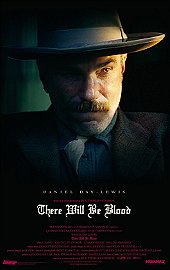Daniel Plainview watches as his oil derrick burns to the ground, a natural gas eruption costing his son the use of his ears and setting back his operation. As thick smoke turns night to day and panic sweeps the site, he kneels enraptured by the flame. The shot turns and shows Plainview in utter darkness, nothing distinguishable save for the glow of flame on his face. The object of his desire, his singular focus in life, giving him his only presence in the shot, giving him presence in the world. It is an incredible piece of economical filmmaking, a singular shot explaining all you need to know about the central character of There Will Be Blood.
Plainview actually explains this later on, in his grandstanding speech with his brother, and it is a rare example of the film overstating a situation. Daniel Day-Lewis gives Plainview so much as an actor in his portrayal of Plainview that a verbal explanation of his traits seems to be almost handholding. Plainview is a creature of instinct, animalistic and dangerous, who hides behind a well honed façade. He’s a primal character and as such grand declarations of psychoanalysis don’t really sit well with the character. As such the performance is based around very physical traits and Anderson plays to this at numerous times.
The silent opening ten minutes tell you a lot about Plainview, about his mindset and determination and how dangerous he is. Plainview is a character we can understand effortlessly, partially because of how nuanced the performance is and partially because he is a representation of something primal and twisted within most men. What makes Plainview magnetic is how human he is in his inhumanity, his goals and ambitions as presented onscreen are monstrous but they’re also believable. There’s an innate truth to the character which makes him exceptionally easy to accept.
Plainview’s rival in the film, the young preacher Eli Sunday, is a character who will be most disassociated from the audience. He faces a natural disadvantage in that There Will Be Blood is ostensibly Plainview’s story (if I remember correctly Plainview is only actually absent from one or two scenes in the entire film) so he has a dominant amount of screen time. As such despite the fact that both men are manipulators (Plainview’s sweet-talk to buy land and Eli’s spiritual healing and communion with god) only Plainview is shown away from his façade. The film is entirely about Plainview, the Jonny Greenwood’s incredible soundtrack even seems to score Plainview’s state of mind rather than the onscreen action, and as such Eli is little more than context to that character.
When I say Eli is context to Plainview I don’t mean to disparage the character, it is just that the way he is constructed and portrayed is more about setting up a mirror to Plainview and drawing out his emotions than presenting the story of the Sunday family. Eli is a character who thinks he can play the game, who thinks he has enough sway to manipulate the situation to his liking. In a way the movie charts how this belief in his own abilities and his inexperience with what he is dabbling in ultimately destroys Eli, both psychically and philosophically (with Plainview quenching Eli’s faith moments before seeking a more hands on resolution).
In a lot of ways Eli represents an intellectual counterpoint to Plainview’s intuitive nature. Eli thinks he can outsmart Plainview, and his few acts of attrition are all mental attacks. In doing so he underestimates Plainview’s resolve and underlying intelligence. Plainview is animalistic, but his façade is developed enough to allow him to match Eli at every turn. His final brutish actions being interspersed with the conniving wordplay and dramatics that were once Eli’s trade. More than anything Eli is desperate to be accepted by people, who want to prove his superiority to and be better than his peers. Plainview in contrast is a character who wants to isolate himself, who is willing to deal with people only as long he has too.
By stepping into Plainview’s home, Eli sacrifices the one advantage he had. In the outside world Plainview had to maintain pretence of humanity, hidden in his own home he is allowed to be the beast that is hinted at throughout the film. Plainview, with no profit to be gained from maintaining his persona, destroys Eli utterly. Taunting the preacher, mimicking his church performances with crazed fits and gaudy sermonizing, before beating him to death.
 Login
Login